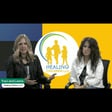Become a Creator today!Start creating today - Share your story with the world!
Start for free
00:00:00
00:00:01

Season Two/Episode Eight: Digital Shields: Protecting Children in the Age of Social Influence
From viral dance videos to professional child influencers, children navigate a digital landscape their parents never imagined. In this episode, cybersecurity expert Maria-Kristina Hayden, former Defense Intelligence Agency professional and founder of OUTFOXM, reveals the hidden risks facing both everyday kids and young social media stars.
Through the lens of recent cases, including the complex journey of teenage influencers earning six figures, Hayden shares what every parent needs to know about digital safety. Whether your child has 10 followers or 10 million, learn why traditional online safety advice is outdated and what works to protect our kids online.
Transcript
Introduction to Guardians of Hope Podcast
00:00:00
Speaker
Welcome to the Guardians of Hope podcast, where we bring together parents, nonprofits, legal and medical experts dedicated to positively impacting children's lives. I'm your host, Cynthia Ramseran. The thoughts and opinions of my guests are not necessarily my own, so thank you all for joining and
Interplay of Childhood and Digital Privacy
00:00:21
Speaker
sharing. All right. Welcome, everyone.
00:00:23
Speaker
In today's digital age, the lines between childhood, privacy, and public exposure have been increasingly blurred.
Challenges for Young Influencers
00:00:32
Speaker
Today, we're diving into a critical conversation about the complex world of young influencers, exploring the systemic challenges and personal experiences that come with broader societal implications of children growing up in the public eye.
Guest Introduction: Maria Christina Hayden
00:00:48
Speaker
Our guest, Maria Christina Hayden, brings a unique perspective from her work in cyber hygiene and resiliency. As a former Defense Intelligence Agency professional and founder of UpFoxum, she'll help us unpack the digital risks facing young people today.
Maria's Professional Journey
00:01:07
Speaker
Maria, Christina, thank you so much for joining me today. Please tell me about your background.
00:01:13
Speaker
Thank you so much for having me, Cynthia. It's a really important conversation and I'm happy to be having it with you today. So as you mentioned, my background spans the government.
Mission in Cyber Hygiene
00:01:24
Speaker
I was a Defense Intelligence Agency Intelligence Officer for cyber issues. ah For a number of years, I was also a civilian member of the United States Air Force. From there, I jumped over to Wall Street to help a major bank stand up a cyber intelligence and war gaming program.
00:01:44
Speaker
And a couple of years later, I started Outfoxem, which, as you mentioned, is focused on cyber hygiene. My mission is really to help individuals everywhere outsmart cyber criminals, or Outfox cyber criminals, as we like to say.
Educating Families on Cyberspace
00:02:03
Speaker
So for our companies, I lead cyber resiliency workshops, war game exercises, executive trainings for the board,
00:02:13
Speaker
to help organizations prepare for all different types of cyber threats. But I'm also really passionate about helping families understand what's going on in cyberspace so that they can protect their homes and their children. So I know that's primarily what we're here to talk about today.
Risks for Young Influencers
00:02:30
Speaker
Thank you. Yes, it is a big topic and there's a lot to discuss. So my first question to you is, as a cybersecurity expert, what brings your attention to the issues surrounding young influencers and online exploitation?
00:02:46
Speaker
You know, this is such an important topic. And for years, we in the cybersecurity community and the cyber hygiene community have really been focusing on the elderly population. And rightfully so, right, because criminals know that folks over the age of 70 have mature retirement accounts. They are not digitally native individuals. They're not as familiar with some of the security settings that you can set on your bank accounts and therefore are potentially more vulnerable. So we've seen a lot of criminals focus on that population. But with every passing year, the risks increase to younger generations as well. So we're seeing criminals
00:03:33
Speaker
pivot in many cases from the elderly generations to target younger folks. And it's something that in my experience with the people I've spoken to, kids and parents are are not really sure how to how to handle it. Now that's not to say that the criminals are not going after those above 65 and 70 anymore, but we're seeing a little bit more of a distribution.
00:04:00
Speaker
When we talk about what what captures my attention with this risk, particularly to young influencers, there are a number of things.
Internet's Permanent Impact on Children
00:04:10
Speaker
But big picture,
00:04:13
Speaker
young influencers are particularly vulnerable because they're navigating these digital spaces that are meant for adults. And they often don't have the life experience or the guardrails in place on these platforms to truly protect themselves from the criminals, the creeps, all of the risks that can be found online.
00:04:39
Speaker
um There are economic factors that that add risk where child influencers or kid influencers, as we call them, start to get a taste of a little bit of monetization, perhaps, or their parents do. And that ah motivates them or incentivizes them to become more and more involved and put more and more information about themselves on the internet. All of this has has risks. All of this has um the potential to truly impact the child for the rest of their life, whether or not they or the parent realize it.
00:05:18
Speaker
ah And we can talk more about this later, but we in the security world like to say that diamonds are forever, but the internet is also forever. Anything you put out on the internet at any time is permanent. Even if the platforms that the information was originally posted on go away, there's always backups and archives. So there's a lot of things like this that children influencers who are building a digital footprint so early may not be thinking about.
Systemic Failures in Digital Protection
00:05:48
Speaker
You make such a good point. I tell my son this all the time. No matter what he thinks can be taken down online, someone can screenshot it. Someone already may have a ah step one step ahead of him. So great point.
00:06:05
Speaker
we've been reading sorry We've been reading a lot of coverage um on young influencers who've begun their online journeys at a very young age, as you just discussed. From your perspective, what failures or what systemic failures allow such potentially dangerous environments to exist?
00:06:25
Speaker
I mean, one of the the the big, the obvious one is just the the nature of the internet today. Everything is so interconnected. There are so many platforms that people can get involved with. And you talk to a lot of children these days who will say that at least 50% of their social life is online. And that's not necessarily a failure. It's just the direction that um many of our cultures are going, right? And it's not going to stop anytime soon.
00:06:51
Speaker
But in terms of failures, I do think there have been some. ah The number one on my list is that of the platforms that these children are engaging with and through. you know Everything from Roblox and Snapchat to Instagram and TikTok.
00:07:07
Speaker
These platforms consistently say that they have our children's best interest in in mind. And you know oh, we have age verification. And no one over no one under the age of 13 is allowed on our platform. Everybody knows how to get around those silly, silly screens. And in my humble opinion, the the platforms could be doing a lot more to protect our children. That could be a whole separate hour-long podcast. ah Other failures exist, though. there are In my opinion, we do not have adequate regulation to help protect these children and allow them to monetize an online presence in a ah safe way with legal guardrails.
Cyber Risks for Young Influencers
00:07:51
Speaker
And another failure is, and this one is difficult to talk about, but many parents who are managing
00:08:01
Speaker
their kid influencers really aren't equipped to do so in a safe way. They are not digital natives. In many cases, they do not fully understand the cybersecurity side of things. They think they're putting privacy safeguards in place, for instance, but they're not doing it as effectively as they hoped. um So those are some of the the failures that are top of mind for me.
00:08:27
Speaker
the And you lead me to my next question. um Can you break down the different types of cyber risks that young influencers face that the average person like their parent managing them may not even recognize immediately? Yes, definitely. So the there are four that I'll mention in in no particular order.
00:08:52
Speaker
One is about artificial intelligence and what we call deep fake exploitation. So all of your audience will have seen deep fakes in the news. But just a brief recap, this is when folks use images, sounds, or videos from the internet to create fake media about somebody impersonating someone. We see this with every passing week on more prevalent with child content, which is horrifying. But we have predators that are scraping publicly available video, voice, and images of children and turning them into all kinds of images and videos using AI and selling them on on the open web, on the dark web, all over the place for all different kinds of buyers. It absolutely makes your stomach turn.
00:09:46
Speaker
Folks don't realize that just by putting your child's face online, somebody could do this. Now, what are the chances of of somebody um taking one photo the one photo of your child that you posted online and turning it into a series of, let's say, pornographic content?
00:10:04
Speaker
the The risk is low. But if you are
Parents' Role in Online Safety
00:10:07
Speaker
a child influencer who has thousands of hours of video on YouTube, hundreds of thousands of videos, um the risk is higher because your exposure is higher. So deepfake and AI exploitation is is one. Two, something called doxing or location exposure. So doxing is a word that came about in the 90s. It comes from the word documents, like docs. And it's ah it's the practice of exposing an online person's physical location. So exposing their physical address, their hometown, their school, something like that.
00:10:44
Speaker
we see ah parents, and sometimes kid influencers as well, inadvertently share, oh, here's my school. This is my cheerleading uniform. This is where I'm going to practice tonight. And it ends up exposing these children to predators who will come to their physical location and potentially do them harm. So that's something that a lot of parents don't think about. um Two more to mention. One is,
00:11:09
Speaker
financial exploitation. As I mentioned before, sometimes these kids get a taste of the monetization piece. you know They get $100 from YouTube because their video got a lot of likes. And they start playing more into this algorithm that really prioritizes and incentivizes extreme, racy,
00:11:33
Speaker
controversial content. That's what these algorithms prefer. um So the the financial piece, especially for such a young brain, can really start to skew those kind of that moral compass at an early age. And then the the last one is really about social engineering. When you put so much information about you or your child on the internet,
00:12:02
Speaker
you are giving criminals who have the intent to do harm to you or your family a lot of useful information that they could use to either send you a can convincing phishing email for you to click on and they drain your bank account or um impersonate you for identity theft. Just lots of risks to putting that much information about your children online.
00:12:26
Speaker
You're so knowledgeable. Thank you, Maria, Christina. I wouldn't have thought of any of those things as
Social Media's Role in Risk Mitigation
00:12:32
Speaker
a parent. So thank you for raising those four points. Now, speaking of parents, what role do we play in protecting or potentially exposing our children in these digital landscapes? You touched on some, but I'm sure there's many more. Huge, huge, huge role. I mean, I think parents have the single most important role. Because as I mentioned before, we cannot depend on these platforms to protect our children. We cannot expect um anyone else to come in and make this a safer place for our children, at least not at this rate. Maybe in the future we'll have some really helpful regulation and and some of these platforms will be held more accountable. But for now, we really have to be, we as parents have to be the,
00:13:22
Speaker
the CIOs of our own home, the chief information officer or the chief information security officer of our own home. And that means we have to instill in our children um some key lessons about online safety. What I find really helps parents a lot is to take some time without your children on on YouTube or reading articles about some of these predatory actions that adults, often men, are taking against young child influencers. When parents read a couple of of those articles or watch a couple of news reports about what's going on and how people are using publicly available information about children, it clicks for the parent immediately. A lot of times parents aren't under
00:14:13
Speaker
ah don't understand or aren't aware um of the risks. you know And it's hard to it's hard to educate your children on something that you're not really up to speed on. So I always tell parents to do a little bit of self-educating to understand that the risk is real. um And do set guardrails around your child's online online activity.
00:14:37
Speaker
um do the research to understand what are the the parental controls and the privacy controls that I should be turning on for my children. Make sure you do those the right way. And and the other thing that is so important that gets overlooked is just always reiterating to your child that if you come across anything online that makes you feel uncomfortable, you can always tell me about it and I'm never going to get upset and I'm not going to take your technology away. This is something we see in common with children and with the elderly is not only they are they afraid to go to their loved one when things get weird online because they're embarrassed and maybe they
00:15:19
Speaker
let's say, had a conversation with a stranger, which they know they shouldn't have. They're embarrassed to go to the loved one for that reason, but they're also scared because they don't want their technology to be taken away. So if you can convey to your child that, look, I'm always going to have your side, you're not going to be punished for coming to me, even if you think you've taken something too far, that is one way to try try to keep that conversation, the door always open.
00:15:47
Speaker
Great. Now, excellent points. Again, we talked a lot about what we as families can do to protect our loved ones. Now let's hold social media platforms accountable. How are they contributing um or potentially mitigating risks of exploitation? So both sides of the spectrum there. Yeah, to dive a little deeper on the the platform side,
00:16:15
Speaker
The algorithms are really these black boxes that only the algorithm engineers inside these companies that are getting paid way too much to ever leave understand. But what we know from the studies that have been done and the things that are plainly visible to anybody on these platforms is that these algorithms reward controversial, extreme sexual content.
00:16:43
Speaker
We also see, unfortunately, that this content from younger audiences is often served to adults from older audiences. um And the the platforms will will deny this, but I've personally seen a number of of studies and kind of investigator moms that that set up profiles and test these things. And so the algorithm has a lot these algorithms have a lot to ah to answer for, in my opinion.
00:17:18
Speaker
the The lack of true age verification is another one. As I mentioned before, it's really easy to to skip past those. ah We often see parents that that help kids get past those screens as well. But on the mitigation side, the good news in my opinion is that Parents are starting to hold these platforms more accountable. We are starting to see CEOs of some of these major tech firms getting called to Capitol Hill to answer for some some damages that the parents are bringing about, that mental health experts are bringing about.
Practical Steps for Parental Guidance
00:17:53
Speaker
you know Unfortunately, we're seeing a rise in in child suicide as a result of social media. and and
00:18:03
Speaker
many the many things that they're being exposed to. And so the discussion is starting to change and people are holding social media social media and other tech platforms accountable. It's just a gradual gradual process. Now, just one more question about what parents can do because I want to bring it back to what we can do at home. If we're concerned about something that's happening with our child's online safety, what are some things we can do immediately to protect our kids?
00:18:33
Speaker
Great question. So in addition to what I mentioned before about trying to keep those conversation channels open and um knowing the risks yourselves as parents, make sure that that there are a couple technological things that you have ensured are turned on on your child's devices. So the two that I like to mention are two-factor authentication and turning off location sharing. So two-factor authentication is, um for example, when you log into your bank account, it needs to send you a text message with a code before it allows you to log in. So your password alone does not grant you access to the account. You also need that second factor of authentication. You can turn those on on a lot of these social media platforms. And what that helps to do is prevent someone who would try to take control over your child's account from getting access.
00:19:31
Speaker
That second factor is a really, really helpful way to keep control of that account and ensure that your child keeps control of that account. The location sharing is something you can sometimes turn off at the phone level. On my phone, I've got location sharing completely turned off always. You can also do it app by app.
00:19:51
Speaker
And you can also do it on photos. And what this helps with is ensuring that if your child shares a photo, you're not also sharing the metadata behind that photo. It's it's trivial. It's very easy for someone with Malinted to click on a photo where the location had been turned on and see exactly where that photo was taken. And that's how people can find you know physical locations.
00:20:19
Speaker
um The other thing that I say is families should have a response plan. So as I mentioned in my intro, I'm always focused on resiliency. Because even though I am an eternal optimist, we can't prevent everything. We can't prevent every kind of cyber attack in business. We can't prevent every single possible digital threat in our personal lives either. But we can be resilient and have a plan for no matter what goes wrong, we know as a family, for instance, what we're going to do.
00:20:52
Speaker
so What I say is every family should have a plan. Sit down just for 20 minutes, little family meeting, and say, if any of us is ever in a scary digital situation, here's what we're going to do. We're going to call another family meeting. We're going to, and then as parents you decide, we're going to shut off the
Family Plans for Digital Threats
00:21:14
Speaker
account. We're going to call our local law enforcement. We're going to report. You make a plan that way.
00:21:21
Speaker
If and when, God forbid, something happens, no one is scrambling to figure out what to do. You've got a plan already. um And I have some resources for that if people want some help getting started.
00:21:33
Speaker
All right, Maria, Christina, you've given me and everyone everyone listening a lot to think about and some really actionable advice. So thank you so much for your time. You are so welcome. I really appreciate you bringing awareness to this issue. um It's so very important. Thank you. So in case anyone wants to reach out to you or learn more about Outfaxum and your work, tell us how they can do that.
00:22:01
Speaker
Sure. ah Folks can learn more about Outfoxum in
Learn More About Outfoxum
00:22:05
Speaker
a couple of ways. So they can go directly to the outfoxum dot.com website. O-U-T-F-O-X-M. I'm also very active on Instagram sharing practical practical cybersecurity tips and on LinkedIn for professional audiences as well. So wherever you typically get your information, Al Foxham is probably there. Thank you so much, Maria and Christina. Happy to. Have a great day.



















